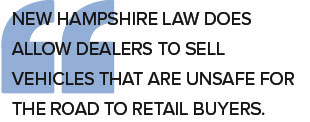By Lisa Lavoie, Relationship Manager
You don’t want to get into trouble with the Federal Trade Commission to fail to post or not follow the Federal Trade Commission Buyer Guide – a most basic rule of selling cars. These FAQs may help.
The FTC has fined dealers for failing to post the FTC Buyer Guide – the most basic rule of selling cars. NH is among a handful of states that requires a second As-Is form (RSA 382-A:2-316).
Below please find some FAQs relative to the FTC and NH laws.
How do I post the FTC Buyers Guide?
The FTC requires that the Buyers Guide must be posted prominently and conspicuously on or in a vehicle when a car is available for sale. This means it must be in plain view, and both sides must be visible. You can hang the guide from the rear-view mirror inside the car or on a side-view mirror outside the car. You also can place it under a windshield wiper. The guide also can be attached to a side window. A guide in a glove compartment, trunk, or under the seat is not conspicuous because it is not in plain sight.
Can I remove the FTC Buyers Guide for a test drive?
You may remove the guide for a test drive, but you must replace it as soon as it is over.
Do I have to display a FTC Buyers Guide if I am selling a vehicle at an auction that is open to dealers and consumers?
Yes. According to the FTC staff, before your used vehicles are offered for sale, sold, or made available for inspection at an auction that is open to consumers, you must prepare and display an FTC Buyers Guide as required by the rule. If the vehicle is sold to a consumer, you must comply with the other requirements of the rule, just as if you had sold the vehicle from your regular place of business. If your used vehicle is sold at the auction to another dealer, you need not comply with respect to that particular vehicle.
Can I sell a vehicle As-Is and also sell or include a service contract?
The FTC Staff Compliance Guidelines state: When a dealer enters into a service contract with a consumer within 90 days of selling the vehicle, federal law prohibits the dealer from disclaiming implied warranties on the systems covered in that service contract. For example, if you are a dealer who sells a car As-Is, the vehicle typically will not be covered by implied warranties (assuming that state law permits As-Is sales). But if you also enter into a service contract covering the engine for six months, you automatically provide an implied warranty on the engine.
Furthermore, the New Hampshire Attorney General’s office stated in its 2006 Consumer Source Book that, “… if a dealer violates the Buyers Guide rule, it provides strong and persuasive evidence that the practice also constitutes an unfair or deceptive practice as defined by New Hampshire’s Consumer Protection Act.” Finally, court cases in other states have interpreted the UCC to provide that a dealer cannot avoid implied warranties in an “As-Is” sale where that dealer sells a service contract within 90 days of the sale.

Is the signature line optional on the FTC Buyers Guide?
Yes, the signature line is optional on the FTC Buyers Guide but not on the NH As-Is form.
Does NH require an As-Is disclosure form in addition to the FTC Buyers Guide?
Yes.
Is the signature line mandatory on the NH As-Is Form?
Yes. RSA 382-A:2-316 (4) To properly sell a vehicle As-Is in New Hampshire, dealers must have the buyer sign a statement which clearly informs the buyer, before the time of sale, in concise and straightforward language that: (a) The goods are being sold on an As-Is or “With All Faults” basis; (b) The entire risk as to quality and performance of the goods is with the buyer; and (c) If the goods prove defective after purchase, the buyer, not the manufacturer, distributor or retailer, shall assume the entire cost of all necessary servicing or repair (RSA 382-A:2-316). This statement must be on a document other than the Buyers Guide as the FTC prohibits changes to the Buyers Guide.
What would turn your As-Is sale into an implied warranty?
When a vehicle is sold As-Is, the dealership personnel must be very careful to avoid any and all statements that would imply the vehicle “is in great shape,” “gets good gas mileage,” and “is a really good car.” The consumer could use statements such as these in an attempt to negate the As-Is document that he/she has signed.
Can I sell a vehicle that doesn’t pass inspection to a retail customer?
New Hampshire law does allow dealers to sell vehicles that are unsafe for the road to retail buyers. However, you cannot issue a 20-day plate to an unsafe motor vehicle. There are precise disclosure requirements for this type of sale.
These forms must be completed to complete the sale legally.
(1) The Notice of Sale of Unsafe Motor Vehicle form (RMDV 950). The Department of Safety (DOS) requires the submission of a completed copy of an official DOS unsafe motor vehicle form. RMDV 950 can be obtained directly from the DOS.
The law also requires a written acknowledgment from the customer of the customer’s rights under this law. You must ask the customer if he/she wants a safety inspection. If the customer requests a safety inspection, following the inspection, you must notify the customer of what repairs are necessary to bring the motor vehicle into compliance with safety inspection laws and note the failed items on the RDMV 950 form. You may charge the customer for the safety inspection. If the customer declines an inspection, make sure that they circle (do not) on the line that states, “I (do) (do not) desire a safety inspection to be conducted.”
If the vehicle does not pass the emissions test, you must give the consumer a Notice of Sale of Vehicle that does not pass OBD II Emissions Testing (RMDV 950A).
(2) The As-Is form (mentioned above).
How should an unsafe vehicle be removed from your lot?
NHADA recommends that you have the customer trailer or tow the vehicle from your business. To discourage the practice, you should simply make towing the vehicle part of the sale.
Lisa Lavoie, Relationship Manager
If you have a question about “As-Is” sales in New Hampshire, please call the Association office at (800) 852-3372.
This story appears in the 2020 Issue 6 of Drive: NH Magazine.







